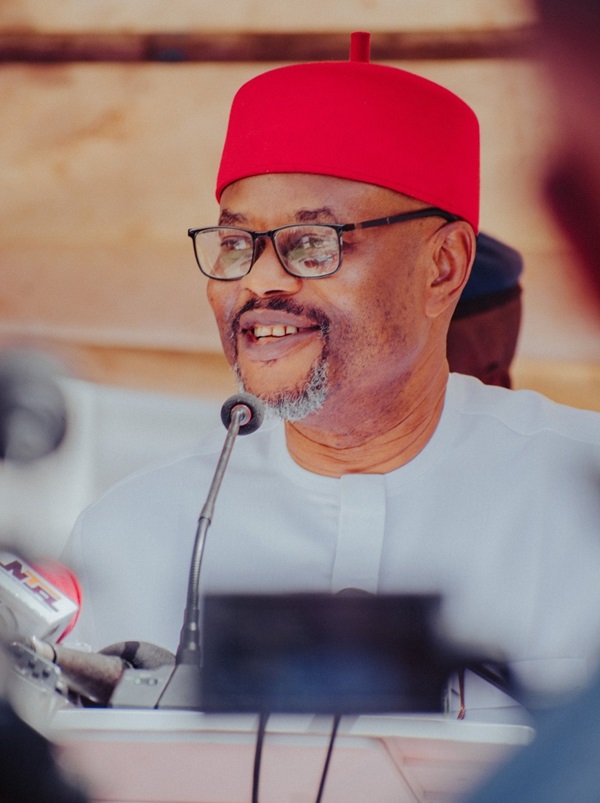– Advertisement –
– Advertisement –
– Advertisement –
– Advertisement –

The Minister of Innovation, Science and Technology, Chief Uche Nnaji has called for cross-disciplinary collaboration to develop innovative solutions to climate change.
He emphasised the need for cooperation across climate science, engineering, economics, policy, behavioural psychology and artificial intelligence to drive sustainable progress.
Nnaji made this call at an interdisciplinary conference on climate change organised by the Directorate of Interdisciplinary Research at Godfrey Okoye University (GOUNI) in Enugu. The conference, themed “Harnessing Interdisciplinary Research to Develop Innovative Solutions to Climate Change,” brought together experts and stakeholders to discuss practical ways to address environmental challenges.
Represented by his special assistant, Dr. Patricks Oghuma, the minister underscored the critical role of interdisciplinary research in shaping the future of nations, stating that Nigeria is poised to lead the way in Africa and beyond. He noted that with its vibrant startup ecosystem, the country has the potential to become a global hub for innovation, investment and sustainable technological advancement.
Research and innovation, he said, have become so disruptive that they no longer require justification for their inclusion in climate change discourse.
“Today, we gather not just to discuss climate change but to explore how Nigeria can turn cutting-edge research into market-driven solutions – where science meets industry for real-world impact. Interdisciplinary research integrates knowledge from diverse fields such as climate science, engineering, economics, policy, behavioural psychology, and artificial intelligence to create innovative, adaptable solutions.
“Climate change is no longer a distant threat; it is a present reality. Rising global temperatures, extreme weather events, biodiversity loss, and sea-level rise demand urgent action. Traditional siloed approaches, where scientists, engineers, economists and social scientists work in isolation, are no longer sufficient. The complexity of climate change requires us to break down disciplinary barriers and collaborate across fields to develop holistic, scalable solutions,” he said.
Nnaji highlighted Nigeria’s dual challenge: mitigating climate threats while unlocking economic growth. From desertification in the North to flooding in the South, the risks are real – but so are the opportunities. With the global green economy projected to be worth $10 trillion by 2050, he posed a crucial question: How can Nigeria position itself as a leader in climate innovation? The answer, he asserted, lies in strategic partnerships that connect academic breakthroughs with industry scalability and entrepreneurial agility.
He lamented that while Nigerian universities and research institutes have produced groundbreaking work in biofuels, solar technology, and drought-resistant crops, many patents remain underutilised. “Industry needs scalable solutions; researchers need commercialisation pathways. Together, we can bridge this gap,” he said.
Speaking on the ministry’s achievements, Nnaji revealed that Nigeria has signed a 2,600-megawatt (MW) solar module supply agreement with LONGi Solar France SARL. The solar modules will power Nigeria’s Green Hydrogen Hub Project, located in the Liberty Oil & Gas Free Trade Zone in Akwa Ibom State. This initiative is expected to transform Nigeria into a regional hub for clean energy production, leveraging its abundant solar resources to drive industrial growth, hydrogen exports and clean mobility solutions. He noted that this is one of the largest solar procurement deals in sub-Saharan Africa.
To support further advancements, Nnaji assured that the government will create policies that reward collaboration and link research grants to commercialisation milestones.
“Interdisciplinary work is not without hurdles – differing terminologies, funding constraints and institutional barriers can slow progress,” he noted. “To overcome these challenges, we must foster collaborative platforms where universities, governments and industries engage in cross-disciplinary dialogue, reward interdisciplinary work by ensuring that funding agencies and academic institutions prioritise collaborative research and engage stakeholders early so that policymakers, businesses and communities are involved from the outset to ensure solutions are practical and scalable.”
He urged stakeholders to build a Nigeria where sustainability is not just an aspirational goal but a thriving economic sector. Strengthening research commercialisation from the university perspective, he argued, is crucial for achieving this vision.
At the conference, renowned professors, researchers, and students presented papers on best practices for bridging the gap between research and innovation. Discussions emphasised the need to align academic output with industry needs to develop scalable, innovative solutions for climate change.
Vice-chancellor, Rev. Fr. Prof. Christian Anieke represented by deputy vice-chancellor (academic), Rev. Sis. Prof. Nwachukwu reaffirmed the university’s commitment to supporting research that contributes to national development. Anieke expressed gratitude to the Minister of Innovation, Science and Technology for sending a capable representative to the conference.
Director of the directorate of inter-disciplinary research, Obiageli Christie Onyia, Ph.D, praised the conference’s impact, stating that the directorate will continue fostering research and collaboration. She extended her appreciation to all dignitaries and participants for their contributions to advancing interdisciplinary research for climate change solutions.
Related
– Advertisement –






